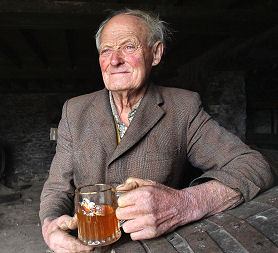Parliament's 'wash-up' brings cheer to cider fans
Updated on 07 April 2010
The start of the 6 May election campaign has triggered a scramble in Westminster to complete the legislative programme before parliament is prorogued tomorrow night. The hot topic - will the cost of cider rise?

Up to 10 bills could survive the next 48 hours - in some form or other - and make it onto the statute books before the doors are closed on the 2005-2010 parliament for the final time - but many other measures have already been consigned to the legislative dustbin.
Labour says that it has not changed any of its policies and will seek to reintroduce any measures it loses if it is re-elected, but given that parliament's business must end by tomorrow night, it can only get through both houses of parliament those bills - or parts of bills - which have cross-party support.
So the Finance Bill - enacting last month's budget measures will get through - but without two key tax changes proposed by Chancellor Alistair Darling, and with a third put on notice of being reversed if the Conservatives win on 6 May.
A new tax on landline telephone bills - of 50p per month plus VAT - to fund the introduction of superfast broadband across the country will not now go ahead - and neither will the planned scrapping of tax relief on holiday homes, which would have affected an estimate 120,000 self-catering holiday businesses from 2011.
Cider cost
But the most controversial measure caught in parliament's "wash-up" is the 10 per cent rise in the cost of cider. That was introduced on 29 March - but will now be reversed on 30 June unless Labour wins the election.
This last change has been met with widespread rejoicing in the west country, not least by The Wurzels pop group, who had a hit in the 1970s with their song "I am a Cider Drinker" and have led the campaign against the increase.
Both the Conservative and Liberal Democrat parties were quick to claim the credit for forcing the government to back down - but the financial secretary to the Treasury, Stephen Timms, said the tax would continue if Labour was returned to office.
Another measure to be curtailed in last-minute negotiations between the parites is the Constitutional Reform and Governance Bill, which will lose its provisions for a referendum on the alternative vote system of electoral reform and for the phasing out of the last of the hereditary peers in the Lords. It is expected, however, that clauses requiring all MPs and peers to be treated as UK-domiciled for tax purposes will become law - as these have cross-party support.
Labour has said it will implement a "democracy day", with referendums on electoral and Lords reform if it is re-elected on 6 May.
The fate of two other measures is uncertain.
Libel law
The government has dropped plans to restrict the charges of "no-win no-fee" lawyers in libel cases. Justice Secretary Jack Straw, says he would like to reintroduce it after the election, although he faces some internal opposition within the Labour party.
The legislation was introduced following concern that fees of up to 100 per cent charged by lawyers representing individuals who won defamation cases could drive some newspapers and magazines out of business and restrict freedom of speech.
The Digital Economy Bill - which would allow for illegal file sharers to be deprived of their internet access - does look like making its way onto the statute book. But the Commons leader, Harriet Harman, told MPs there would be further public consultation before those parts of the Bill took effect.
Ms Harman's own pet measure - the Equality Bill - has gone for Royal Assent after a compromise was reached letting through Lords amendments to protect pregnant schoolgirls and young mothers from discrimination in schools. The bill will allow - but not force - religious groups to hold civil partnership ceremonies on their premises but, following a series of government defeats in the Lords, will also allow churches to continue to refuse to employ gays and transexuals.
The Crime and Security Bill and the Children, Schools and Families Bill should complete their passage by tomorrow night, along with a handful of other measures - including the amendment to the Misuse of Drugs Act which would outlaw the dance drug mephedrone.
The prorogation of parliament tomorrow night will end the work of MPs and peers, although the formal dissolution of parliament will take place on Monday.
Following the general election, parliament will not reconvene until 18 May, allowing for the possibility of cross-party negotiations in the event of a hung parliament, with no single party having an overall majority.
The Queen's Speech, officially opening the new parliament, will then take place during the following week.





